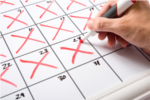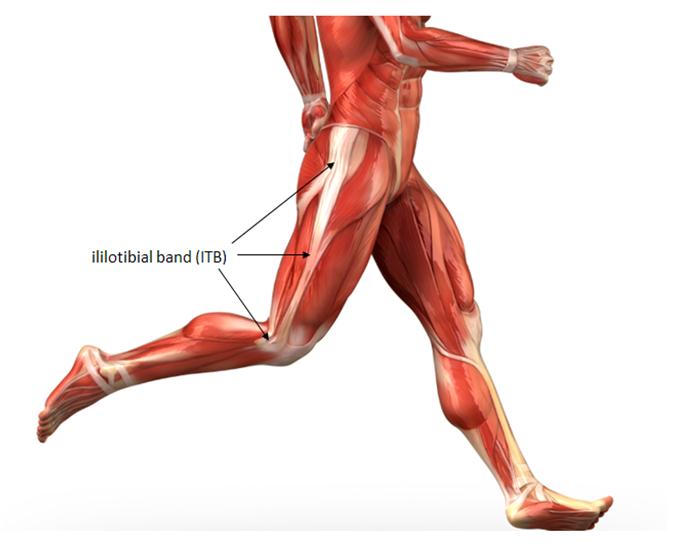A few weeks ago, I wrote about when it's OK not to exercise. Not long after that, I found myself taking my own advice. It started with a substandard Sunday morning run, where I ran out of gas at about 5 miles -- and more than a mile from my car. The previous week at work had been really grueling, and I overestimated my energy stores. The next day, I started feeling some discomfort in my hip, and I began to suspect an IT band problem. So I decided to take some days off from exercise.
If you've taken that blog post to heart, I hope you're saying to yourself, "That's the smart move." It takes more than a week to lose significant fitness, but trying to work through an injury can put you out of commission for a lot longer. So the wise course of action is to rest up, enjoy the break, see a doctor if you need to, and then get back at it when you're ready.
If only it were that simple.
Day one of my break was nice. I slept in. My body was really worn out from that last week of work plus trying to jam in workouts. Day two wasn't bad, either -- despite sleeping an extra 20 minutes, I got to work earlier than usual. But by day three, I was starting to wonder when I could get back at it. On day four I was chomping at the bit. And by day five, Friday, I was flat-out cranky.
I'd bet any Regular Guy committed to his fitness would feel that way.
I can speak only for myself, but here are some of the mental issues I ran into:
- I felt fat. I think it's in my head, but by the end of the week, I really didn't like what I saw in the mirror.
- I began to worry I was giving up on my fit-minded lifestyle. Moreover, I began to feel like a fraud. Here I am writing about fitness and not practicing it myself.
- I was careless about my diet. I won't say it was a significant departure from my norm, but there were certainly a number of instances of "screw it, who cares," followed by candy or cheese and crackers.
- I had less patience with the people around me. I find that exercise, particularly running, helps reset my crank-o-meter. I was very snippy and curt to my wife, my boss, my daughter and pretty much everyone else.
- I was less focused. You'd think the extra time in my day would help, but I got no more done than I would in any other week. Many organization experts will tell you that a regimented routine and full schedule actually help you get things done.
So on Saturday, I decided to give a bodyweight workout a shot. I stayed away from any exercises that put a lot of strain on my hips, such as mountain climbers, lunges and squats. And I self-monitored closely in case I felt anything unusual. Fortunately, I was able to do a pretty decent routine, I felt fine right afterward, and once I'd totally cooled down, it was no worse than before.
 But that may not be the case for every Regular Guy who has to take some time off from exercise. You may wind up losing weeks or even months to an injury, to a serious illness, or simply to the demands of real life. I can't say I have a lot of answers, but here are a few pointers:
But that may not be the case for every Regular Guy who has to take some time off from exercise. You may wind up losing weeks or even months to an injury, to a serious illness, or simply to the demands of real life. I can't say I have a lot of answers, but here are a few pointers:
Figure out what you can do.
If your hurt, maybe you can change up your routine like I did. If you're ill, try to make sure you move around, even walk a little bit, until you improve. If you are pressed for time because of work or a family obligation, figure out where you can find a few minutes in your day -- anything is better than nothing. Perhaps you can swap out the gym for 10 minutes of crunches and push-ups. Or maybe just work some walking into your routine.
Try to focus on your diet.
If you're burning 500 calories four times a week by working out, you have to be cognizant of that when you put things on hold. It's hard. Your appetite will stay high for a while. Your eating habits are hard to alter on a dime. And it's easy to fall into the depression trap, where you figure you're just giving up, so why bother. One spot where you can catch a break: no recovery drinks. There's 100 or 150 calories right there!
Force yourself to be productive.
I failed at this. Somehow, despite not having run a single mile or done a single pushup in a week, I hadn't written a single word for FftRG. There was plenty of TV watched, many games of video Boggle played. And that lack of productivity snowballs quickly.
Remind yourself why you're resting.
One thing I was able to do was to tell myself, "You're doing the smart thing, even if you don't like it." It does make you feel a bit better. It helps you keep in mind that this is a temporary situation, and you'll get back to it soon enough. That's why, though my diet hasn't been great this past week, it hasn't gone off the cliff. It's why I've pushed myself to walk from the PATH to my office, despite some brutally cold temperatures. I know that I'll be in a better position to pick things back up fully if I remember that I'm actually doing myself some good.
The mental toll that you take from sitting out is sometimes worse than the physical. And it's hard to overcome. There's plenty of advice out there for what to do to take care of your body, but not much for your brain. So, Regular Guys, let's hear from you. How do you cope when you can't exercise?

Watches in general supposedly began production around the 1850s, and with time they replica watches sale have only gotten better. Watchmakers have evolved from a handful of manufactures in the 1800s to the thousands of brands available to you now, many of which produce replica watches. The Swiss are said to make the best watches, but these fine timepieces also come with pretty hefty price tags attached to them as well. Some people can afford rolex replica sale like the Concord Mariner watch or fake rolex sale, and some people can't. I think this is one of the most important reasons that watch companies have decided to make breitling replica uk in various types, brands, and prices — which is also probably the reason the replica watches uk and time piece industry is as big and popular as it is.
ReplyDelete